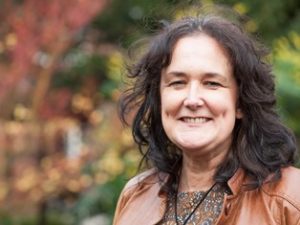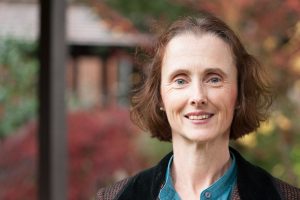
This week’s research article comes to us from the IoE’s Dr Carol Fuller via The Outdoor Learning Blog… by Natural Connections. Carol is a sociologist and associate professor at the Institute of Education. She works closely with Fiona Craig and colleagues at Ufton Court Adventure, researching the ways outdoor residential visits affect confidence, self-esteem and educational outcomes.
Above: Dr Carol Fuller of the IoE

I am involved in research that looks at ways a student identifies themselves as a learner. Both confidence to achieve educationally and their future career ambitions are keys to explaining their educational aspirations and outcomes. My research explores how attitudes towards education and future aspirations are not always directly related to actual attainment or potential. They are rather the result of a student’s own understanding of their chances of success.
Sociologists (Beck, 1992; Bourdieu, 1984 and Goldthorpe 1997) have long argued that the process for developing confidence and belief in one’s ability to succeed at school, alongside the ideas young people draw on to make these assessments, are complex and myriad. Cognitive social theories of psychologists such as Bandura (e.g. 1995), for whom self-efficacy, i.e. the belief in one’s ability to succeed in specific endeavours, is in part influenced by ‘seeing people similar to themselves succeed’ alongside ‘mastery experiences’ (emphasis in the original), i.e. those that provide ‘experience in overcoming obstacles through perseverant effort’ (Bandura 1995:7) also utilises these ideas.
For some students who are underachieving, the classroom can become a space that reinforces negative messages connected to how they see themselves educationally. Thus moving outside the traditional learning environment may be of particular relevance when considering the educational attainment of students from poorer socio-economic backgrounds and useful for practitioners who seek ways to promote attainment via Pupil Premium funding.
The ‘Outdoors Indoors’ research project therefore aimed to look at the impact of residential experiences on the confidence and examination success of a group of underachieving young people from socially disadvantaged backgrounds. I wanted to understand and develop an evidence base to show how, and in what ways, outdoor residential experiences can influence and shape educational outcomes as well as a young person’s sense of educational confidence and ambition.
Methods
The research involved a three year project which focused on two groups of year nine (age 14) to year eleven (age 16) students attending an academy school in the South East of England. 12 students had a three day residential visit twice a year for three years (six visits in total). Data was collected via questionnaire, interview and observations and also included school tracking data and GCSE attainment. Data for the students was compared a control group who did not participate in the research.
The school itself is situated in an area of high social deprivation and was the most deprived area locally. 54% of its student population is considered disadvantaged and the school is positioned within the top 5% of areas most deprived nationally for education, skills and training. The research began in the summer 2013, after the school was placed on Special Measures. The school was removed from this category in Spring 2014 and then replaced onto Special Measures in January 2016. In the year that the students in this research took their GCSE exams, only 26% of the 171 year 11 cohort achieved 5 A*-C (a recognised measure of attainment in England and Wales at the time of this research), compared to 57% locally and 54% nationally (DfEa 2015).
Key Findings
From the Attainment Data
A statistical analysis of the predicted overall attainment for students in their best 8 subjects with their actual attainment (i.e. what they were predicted with what they achieved) shows that the research group did significantly better than the control group. Whilst overall, neither group achieved what they were predicted to, the research group still did much better, with their attainment only just under what was expected. This is in sharp contrast to the control group which were almost 14 points below their expected score. These results were further tested and were found to be highly statistically significant. This is an important finding given the context and attainment of the school overall in 2015
When looking at the three core subjects, the research group made significant gains in English and marginal gains in Maths – both of these were also found to be statistically significant. This is an exciting finding and one that suggests an area of great potential for further gains when embedding this aspect of the outdoor learning experiences much more explicitly into the programme.
In science, the research group made a greater overall average gain than the control group. However, this was not statistically significant so is interpreted cautiously. That said, given that gains in overall scores were still observed, embedding this very explicitly into the outdoor programme is also likely to be highly beneficial.
For Practioners
- ‘Repeatedness’ is considered as the fundamental key to the success of these visits. This is because repeated visits enabled students to embed their learning and ensure the longer term impact of their visits
- The ‘Cohort Effect’ was also important to the outcomes of the research. Being part of a fixed cohort enabled students to develop relationships out of school which then had an important impact when transferred back into school
- Unexpected outcomes were the way that students could clearly link their different experiences on the visits to a change in their own approach to learning within school
- Students self-reported improvement in attainment in year 10 as a result if their own sense of increased confidence in school was mirrored in their actual results
- Improved relationships with teachers, family and friends were an additional positive outcome of the Ufton experiences. Improvements in confidence resulted in better behaviour at school and home and this had positive consequences for relationships outside of school.
- Improved confidence in school resulted in greater participation in the life of the school, and in extra-curricular activities.
For further information or a copy of the research paper, please email Dr Carol Fuller c.l.fuller@reading.ac.uk




 LASAR (Learning about Science and Religion), set up in 2009, seeks to explore new ways to discover and advance students’ and the wider public’s reasoning about science and religion.
LASAR (Learning about Science and Religion), set up in 2009, seeks to explore new ways to discover and advance students’ and the wider public’s reasoning about science and religion.